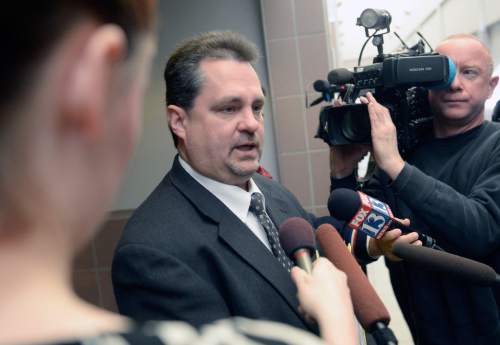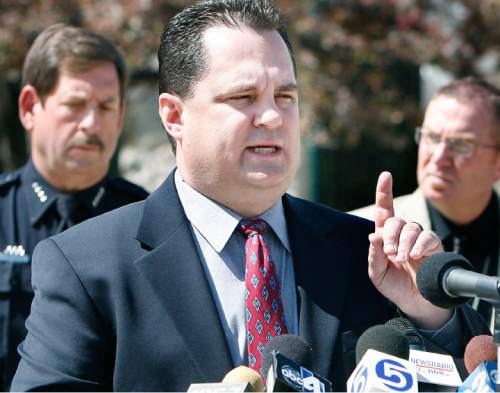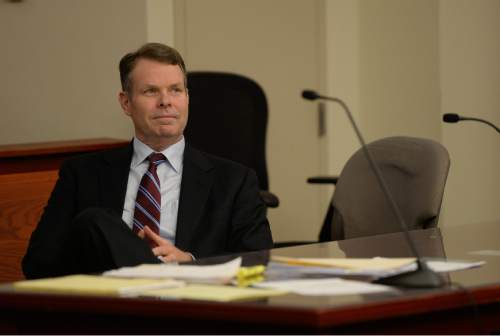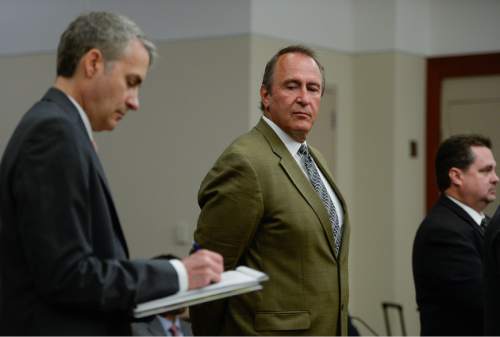This is an archived article that was published on sltrib.com in 2016, and information in the article may be outdated. It is provided only for personal research purposes and may not be reprinted.
Davis County Attorney Troy Rawlings will be getting help from state officials to pay for the wider, ongoing investigation stemming from the prosecution of former Utah Attorney General Mark Shurtleff after his own County Commission balked at covering the costs.
"In fact, with respect to the important elements of the wider endeavor, Mr. Shurtleff is not a target or a subject, he is a witness," Rawlings told The Salt Lake Tribune in an email.
The Davis County prosecutor declined to provide any specifics about where an investigation might go, but past public and court records suggest it could implicate federal law officials and business and political power brokers from Utah to Washington, D.C., in possible misdeeds or cover-ups.
The Davis County Commission has told Rawlings he should not use local funds for such a probe or prosecutions, according to an email obtained through the state's open-records statute. Rawlings agreed, then turned to the attorney general's office for funding, according to the email dated Feb. 9.
Rawlings said in a statement that the investigation — known as "Rogue Runner" — has stretched "well beyond" the allegations of misconduct by Shurtleff while in office and agreed that Davis County shouldn't be expected to bear those costs.
Jim Smith, the Davis County Commission vice chairman, said commissioners "have some concerns about our Davis County citizens paying for the entire process."
"We also have not expanded their budget to allow for the amount of work that's involved," he said.
Rawlings asked for additional money from the Attorney General Litigation Fund and the Utah Prosecution Council to continue the prosecution, according to his email to Spencer Austin, chief deputy for criminal matters at the attorney general's office.
Utah Attorney General Sean Reyes appointed Rawlings as a special assistant attorney general to allow him to handle the Shurtleff case. In his email, Rawlings cites that status as a reason for seeking the funds.
Attorney general spokesman Daniel Burton confirmed that up to $50,000 will be allocated to Rawlings for use "as needed."
"It's not necessarily a blank check," Burton said. "It depends on whether they actually need it or not."
Rawlings said the FBI and Salt Lake County District Attorney Sim Gill "will also continue to assist with funding in those areas where they can."
Rawlings, a Republican, and Gill, a Democrat, began investigating Shurtleff and his successor John Swallow in early 2013. Their effort became the sole push to prosecute the two when the Department of Justice's Public Integrity Section pulled out in September of that year. The FBI continued to assist the two county prosecutors despite the Justice Department's retreat.
Gill, whose office is prosecuting Swallow after his case and that of Shurtleff were separated, recently paid for the copying of a huge cache of possible evidence in electronic form, Rawlings said.
Gill said his office is large and absorbed the cost of the Swallow prosecution.
"We have made expenditures, and, as we have made those expenditures, we have shared [with Rawlings] in the fruits of that effort," Gill said when asked if his office had provided financial support to the Davis County attorney.
Shurtleff and Swallow have pleaded not guilty to multiple felony and misdemeanor counts that stem from allegations of public corruption in the attorney general's office.
The two former Republican officeholders were jointly charged in 2014 after a multiyear investigation conducted by the FBI and the Utah Department of Public Safety.
The Tribune filed public records requests seeking information about the cost of the respective prosecutions from Rawlings, the Davis County Commission, the attorney general's office, the Salt Lake County district attorney's office and the Salt Lake County Council.
Both Davis County offices denied The Tribune's requests. The attorney general's office said it was unable to respond until Friday because of a high volume of such requests. Gill was included on the distribution list of recipients of Rawlings' Feb. 9 email, and his office provided that communication to The Tribune in response to the records request.
Burton said Reyes declined a request for an interview about Rawlings' funding request, which had appeared stalled until this week.
Reyes is "walled off" from the Shurtleff and Swallow investigations and did not participate in the decision-making about funding because they were his predecessors and he had run against Swallow for the Republican nomination in 2013, Burton said.
According to state law, the litigation fund is part of the attorney general's annual budget and can be tapped to cover expenses related to "actions under state or federal antitrust, criminal laws, or civil proceedings."
Rawlings said his office has not been expending county funds on the Shurtleff prosecution and that he and others have been working early days, late nights and weekends to ensure they don't intrude into their normal workload. Additional funding, however, will be needed to press on with their wider probe.
Rawlings and Gill have said that the investigation had stretched beyond Shurtleff and Swallow to include allegations involving former U.S. Senate Majority Leader Harry Reid, D-Nev., and Sen. Mike Lee, R-Utah.
St. George businessman Jeremy Johnson has said that Swallow helped set up a deal with the late payday lender Richard Rawle to shuffle money to Reid and enlist his help in stalling an investigation into Johnson's online marketing company by the Federal Trade Commission. Lee's name has popped up in court documents as the recipient of allegedly illegal campaign donations by Johnson.
Documents also show that Rawlings is pursuing an investigation into the U.S. attorney's office in Utah and the U.S. Department of Justice Public Integrity Section over their handling of the Johnson case and decisions to bow out of the Swallow-Shurtleff probes.
Johnson was recently convicted by a federal jury of eight counts of providing false information to a bank, but was acquitted on 78 other charges related to allegations of bank fraud.









